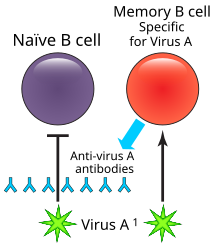Humoral immune deficiency
| Humoral immune deficiency | |
|---|---|
 | |
| B cells and antibody | |
| Specialty | Hematology |
| Symptoms | Sinusitis[1] |
| Causes | Absent B cells(primary),[2][3] Multiple myeloma(secondary)[4] |
| Diagnostic method | B cell count, Family medical history[5][6] |
| Treatment | Immunoglobulin replacement therapy[5] |
Humoral immune deficiencies are conditions which cause impairment of
selective IgA deficiency, occurring between 1 in 100 and 1 in 1000 persons, depending on population. They are associated with increased vulnerability to infection, but can be difficult to detect (or asymptomatic) in the absence of infection.[citation needed
]
Signs and symptoms
Signs/symptoms of humoral immune deficiency depend on the cause, but generally include signs of infection such as:[1]
Causes
Cause of this deficiency is divided into primary and secondary:
- Primary the

- Absent B cells with a resultant severe reduction of all types of antibody: BLNK deficiency, thymoma with immunodeficiency
- B cells low but present, but with reduction in 2 or more isotypes (usually IgG & IgA, sometimes IgM): TACI (TNFRSF13B) deficiency, BAFF receptordeficiency.
- Normal numbers of B cells with decreased Hyper-IgM syndromes
- Normal numbers of B cells with isotype or light chain deficiencies: heavy chain deletions, kappa chain deficiency, isolated IgG subclass deficiency, IgA with IgG subsclass deficiency, selective immunoglobulin A deficiency
- Transient hypogammaglobulinemia of infancy (THI)
- Absent B cells with a resultant severe reduction of all types of antibody:
- Secondary secondary (or acquired) forms of humoral immune deficiency are mainly due to hematopoietic malignancies and infections that disrupt the immune system:[4]
- Multiple myeloma
- Chronic lymphoid leukemia
- AIDS
Diagnosis

In terms of diagnosis of humoral immune deficiency depends upon the following:[5][6]
- Measure serum immunoglobulin levels
- B cell count
- Family medical history
Treatment
Treatment for B cell deficiency (humoral immune deficiency) depends on the cause, however generally the following applies:[5]
- Treatment of infection (antibiotics)
- Surveillance for malignancies
- Immunoglobulinreplacement therapy
See also
References
- ^ ISBN 9780323085939.
- ^ a b "Pure B-Cell Disorders: Background, Pathophysiology, Epidemiology". 2017-01-06.
{{cite journal}}: Cite journal requires|journal=(help) - ^ PMID 16680902.
- ^ ISBN 978-1-4051-2665-6.
- ^ PMID 19597006.
- ^ ISBN 978-1437716047.
- PMID 23465663.
Further reading
- Ahn, Sam; PMID 20477641.
- Honjo, Tasuku; Reth, Michael; Radbruch, Andreas; Alt, Frederick (2014-10-09). Molecular Biology of B Cells. Elsevier. ISBN 9780123984906.
